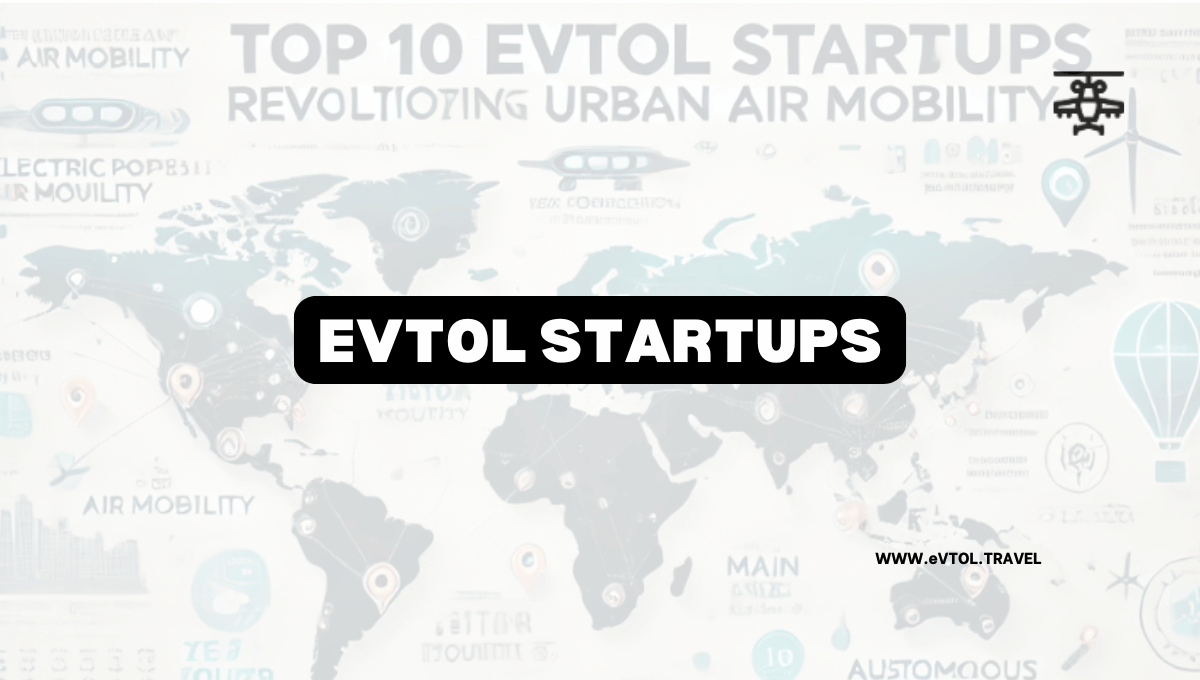Top eVTOL Startups Revolutionizing Urban Air Mobility


The transportation landscape is on the cusp of a revolution, with electric Vertical Take-Off and Landing (eVTOL) technology poised to reshape how we think about travel. As urban centers become increasingly congested, the demand for innovative solutions to move people and goods efficiently is higher than ever. eVTOL aircraft offer a promising answer, combining the speed and efficiency of air travel with the flexibility of on-demand services. This article explores the top eVTOL startups driving this transformation, providing an in-depth look at their technology, market potential, and the challenges they face.
Understanding eVTOL Technology
eVTOLs represent a significant leap forward in aviation technology. Unlike traditional aircraft, eVTOLs do not require a runway, making them ideal for urban environments. The key to their operation lies in their ability to take off and land vertically, much like a helicopter, but with the added benefits of electric propulsion.
Electric Propulsion Systems: At the heart of every eVTOL is its electric propulsion system. These systems typically consist of multiple electric motors connected to rotors or ducted fans. The use of electric motors offers several advantages, including lower operating costs, reduced noise, and zero emissions. However, the reliance on electric power also presents challenges, particularly in terms of battery life and energy density.
Battery Technology: One of the biggest hurdles facing eVTOL developers is the current limitations of battery technology. Most eVTOLs rely on lithium-ion batteries, which, while advanced, still lack the energy density required for long-range flights. Some companies are exploring alternative battery technologies, such as lithium-sulfur or solid-state batteries, which could offer higher energy densities and longer flight times.
Autonomous Flight: Many eVTOL startups are also developing autonomous flight capabilities, which would allow these aircraft to operate without a pilot. Autonomous flight not only reduces the need for trained pilots but also increases safety by reducing the potential for human error. However, achieving fully autonomous flight requires significant advances in artificial intelligence, sensor technology, and regulatory approval.
Vertiports: To fully realize the potential of eVTOLs, dedicated infrastructure, known as vertiports, will be needed. These facilities will provide takeoff and landing pads, charging stations, and maintenance facilities for eVTOL aircraft. Integrating vertiports into urban landscapes will require careful planning and collaboration between city planners, architects, and transportation authorities.
The Impact of eVTOLs on Urban Mobility
The introduction of eVTOLs could have far-reaching implications for urban mobility. By providing a faster and more efficient means of transportation, eVTOLs have the potential to alleviate traffic congestion, reduce travel times, and decrease pollution in urban centers.
Reducing Traffic Congestion: In many major cities, traffic congestion is a significant issue, leading to lost productivity and increased pollution. eVTOLs offer a way to bypass congested roads entirely, allowing passengers to travel directly from one point to another without the need for ground transportation. This could significantly reduce the number of vehicles on the road, leading to less traffic and a cleaner urban environment.
Environmental Benefits: Traditional forms of transportation, particularly cars and airplanes, are major contributors to greenhouse gas emissions. eVTOLs, which are powered by electricity, produce no direct emissions, making them a more environmentally friendly option. As the world moves towards more sustainable forms of transportation, eVTOLs could play a crucial role in reducing the carbon footprint of urban travel.
Economic Impact: The widespread adoption of eVTOLs could also have significant economic benefits. By reducing travel times and improving access to different parts of a city, eVTOLs could boost productivity and make cities more attractive places to live and work. Additionally, the development and deployment of eVTOL technology could create new jobs in areas such as manufacturing, maintenance, and operations.
Top eVTOL Startups Shaping the Future of Urban Air Mobility
The race to dominate the skies with electric Vertical Take-Off and Landing (eVTOL) technology is intensifying, with startups from around the world pushing the boundaries of innovation. These startups are not just developing aircraft; they are pioneering the future of urban air mobility (UAM), promising faster, greener, and more efficient travel within and between cities. In this article, we’ll explore some of the leading eVTOL startups that are set to revolutionize how we think about transportation.
1. Joby Aviation
Location: California, USA
Founded: 2009
Joby Aviation is one of the most well-funded and advanced eVTOL startups in the world. The company has developed an all-electric aircraft designed to carry four passengers and a pilot, with a range of up to 150 miles on a single charge. Joby has already conducted over 1,000 test flights and has entered into partnerships with companies like Toyota and Uber, positioning itself as a leader in the urban air mobility market.
2. Lilium
Location: Munich, Germany
Founded: 2015
Lilium’s distinctive design sets it apart from other eVTOL startups. The company’s jet-powered eVTOL, which uses ducted fans, can travel up to 186 miles at speeds of 175 mph. Lilium aims to offer regional air mobility services across Europe and the United States by 2025, making it a significant player in the eVTOL landscape.
3. Archer Aviation
Location: Palo Alto, California, USA
Founded: 2020
Archer Aviation has quickly risen to prominence with its focus on sustainable urban air mobility. The company’s "Maker" aircraft is designed for short-distance travel within cities, with commercial operations expected to begin in 2025. Archer has secured a major partnership with United Airlines, which plans to integrate eVTOLs into its future fleet.
4. Volocopter
Location: Bruchsal, Germany
Founded: 2011
Volocopter is one of the most recognized names in the eVTOL space. The company’s multicopter design features 18 rotors, offering enhanced safety and stability. Volocopter has conducted test flights in several cities, including Singapore and Dubai, and plans to launch commercial air taxi services in the near future.
5. Beta Technologies
Location: Burlington, Vermont, USA
Founded: 2017
Beta Technologies is developing an eVTOL aircraft that doubles as a cargo carrier. Their Alia-250 model has already attracted attention from logistics companies like UPS, which plans to use it for cargo delivery. Beta is also focusing on building charging infrastructure for electric aircraft, making it a key player in the eVTOL ecosystem.
6. EHang
Location: Guangzhou, China
Founded: 2014
EHang is a pioneer in the autonomous aerial vehicle sector, focusing on fully autonomous eVTOLs. The company’s flagship aircraft, the EHang 216, is already operational in parts of China and has received regulatory approval for trial flights in Europe. EHang is positioning itself as a leader in the autonomous air taxi market.
7. Vertical Aerospace
Location: Bristol, UK
Founded: 2016
Vertical Aerospace is focused on developing a commercially viable eVTOL capable of carrying four passengers over 100 miles. The company has received significant pre-orders from airlines like American Airlines and is working closely with Rolls-Royce on its propulsion systems.
8. Wisk Aero
Location: Mountain View, California, USA
Founded: 2019
Wisk Aero is a joint venture between Boeing and Kitty Hawk, dedicated to developing autonomous eVTOLs. The company’s "Cora" aircraft is designed to operate without a pilot, using advanced autonomous flight technology. Wisk aims to make autonomous air taxis a reality within the next decade.
9. Urban Aeronautics
Location: Yavne, Israel
Founded: 2001
Urban Aeronautics is developing the CityHawk, a compact eVTOL designed for dense urban environments. The company is targeting various applications, including air ambulances and emergency services, making it a versatile addition to the eVTOL market.
10. Terrafugia
Location: Woburn, Massachusetts, USA
Founded: 2006
Originally focused on flying cars, Terrafugia, now owned by China’s Geely, has shifted its focus to eVTOL technology. The company’s TF-2 eVTOL is designed for seamless door-to-door transportation, integrating both air and ground mobility.
The Future of eVTOL Startups
The eVTOL market is set for rapid growth, driven by technological advancements, regulatory progress, and increasing investment. These startups are at the forefront of this transformation, each bringing unique innovations to the table. As urban populations continue to swell, eVTOLs could soon become a common sight, offering a faster, more sustainable alternative to traditional ground transportation.
For enthusiasts and investors alike, the eVTOL industry presents a thrilling opportunity to witness the dawn of a new era in aviation. These startups are not just building aircraft; they are shaping the future of how we move, work, and live.
As the eVTOL industry continues to grow, it's clear that these top startups are leading the charge in transforming urban air mobility. Their innovative technologies, commitment to sustainability, and strategic partnerships are setting the stage for a future where air travel is more accessible and environmentally friendly. Keep an eye on these companies as they redefine how we think about transportation in our cities. For more insights and updates on the latest in eVTOL technology, stay tuned to eVTOL.travel.
If you have any questions or want to learn more, feel free to reach out to us at contact@laxmankafle.com.